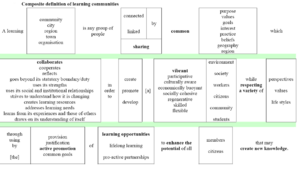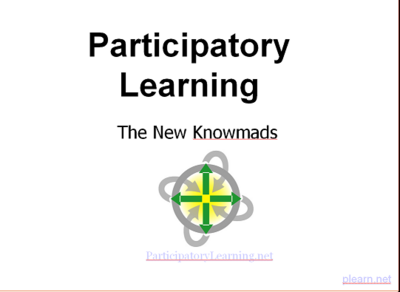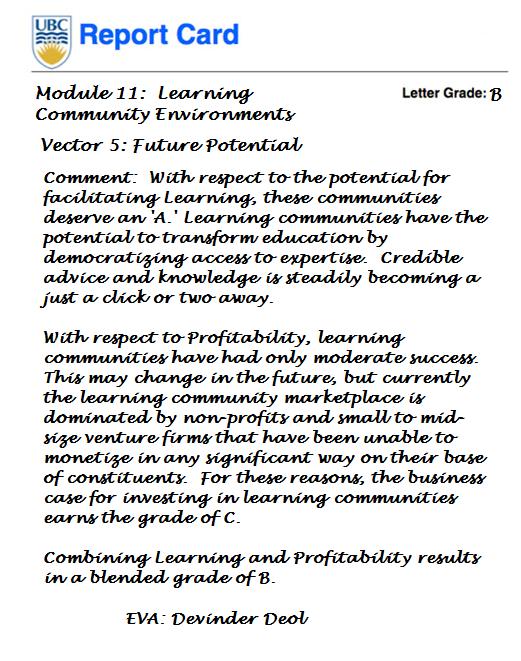Course:ETEC522/2010ST1/LearningCommunityEnvironments/Vector 5-Future Potential
Prescribed Learning Outcome
By the end of this vector, ETEC522 participants should be able to:
1. describe some trends in online learning communities
Vector 5: Future Potential
Towards a Definition of Learning Communities for the Twenty-First Century

Kilpatrick, Barrett, & James (2003) considered the value of learning communities in shaping twenty-first century education. They proposed the following:
"Learning communities have much to recommend them in an increasingly complex world. Many Learning Communities are consistent with a constructivist approach to learning that recognizes the key importance of interactions with others, and the role of social interactions in the construction of values and identity...Learning communities can appreciably minimize risks and maximize opportunities for individuals or organizations."
The concept of Learning Community continues to rapidly evolve. Click on the thumbnail to the right to view an emerging and composite definition:
(Adapted from Adult Learning Australia, 2000 & Kilpatrick et al., 2002)
Participatory Learning
Participatory Learning is an exciting movement that is driving the expansion and adoption of learning communities.
What is Participatory Learning? Participatory Learning includes the ways in which new technologies enable learners (of any age) to contribute in diverse ways to individual and shared learning goals. Through websites, games, blogs, social network sites, cell phones, mobile devices, and other digital platforms, learners can participate in virtual communities where they share ideas, comment upon one another's ideas, and plan, design, advance, implement, or simply discuss their learning together. (HASTAC, 2010).
In short, participatory learners come together to aggregate their experiences in a way that makes the whole ultimately greater than the sum of the parts.
Click here to launch Participatory Learning Slide Show

Participatory learning can be as simple as adding a review to Amazon.com or Trip Advisor.com or as formalized as a corporate virtual learning community. Wikipedia, the largest accumulation of knowledge the world has ever known, is the best known example of participatory learning in action
We all learn from experts. But we are also all experts in some things and, in participatory learning, we share our expertise and we improve it by interacting with those who have different expertise. In many emerging learning communities, credible advice is often just a click away.
Many observers have written about the various aspects of participatory learning and how transformative it can be. It is described in distinct catch-phrases:
Here Comes Everybody: The power of Organizing without Organizations (Clay Shirky)
Convergence (Henry Jenkins)
Web 2.0 (Tim O'Reilly)
The Long Tail (Chris Anderson)
Smart Mobs (Howard Rheingold).
Participatory learning has the ability to enable learning communities to come together and explore solutions for minor issues, such as planning a holiday, to enormous issues such as global warning. In participatory learning, one doesn’t need a degree to contribute - all that is needed is expertise, ideas, and a shared commitment to learning (Davidson, If you have a problem, Ask Everybody!, 2008).
Venture Initiatives

eduFire is a California-based Web 2.0 startup company focused on video teaching training. It was originally promoted as a language learning engine. However, as it has grown, it has also expanded to offer preparation for tests such as the ACT, SAT, and GRE, as well as topics such as computer technology training. eduFire is technically free, but teachers are encouraged to charge for their classes, as the company derives revenue from a 15% fee from hourly sessions paid by users.
Check out these great recordings of a couple of eduFire class: Making a Career Out of Web Analytics or The 10 Most Common Mistakes People Make When Investing
![]() Questler is a learning network that enables members to reflect on their everyday learning with individuals that share their interests and quests. Anyone can start a conversation, discuss and share opinions.
Questler is a learning network that enables members to reflect on their everyday learning with individuals that share their interests and quests. Anyone can start a conversation, discuss and share opinions.


You Can Learn Series is a website dedicated to self improvement. Topics of peer expertise include: ideas in programming, landscaping, asp.net, sql, weight training, web business success, travel, weightlifting, plants, gardening, diets, and good health.

Unclasses involves a free registration with the site and then creation of a new course listing, either as a prospective student or as an instructor. Other people in your area interested in the same topic can join in, and since the process is self-organizing, the group determines when and where to meet. (Un)classes has built a base around major cities in the Americas from Bahru to Vancouver, offering a range of un-course options from Ayurvedic cooking to Zen meditation.

The Peer 2 Peer University (P2PU) is an online community of open study groups for short university-level courses. P2PU helps students navigate the wealth of open education materials that are out there, creates small groups of motivated learners, and supports the design and facilitation of courses. Students and tutors get recognition for their work. P2PU is attempting to build pathways to formal credit for completed coursework.

Kreeo is a collective intelligence platform that enables users to discover, seek and showcase knowledge while 'building and evolving a collective mind.'

University of the People (UoPeople) is the world’s first tuition free online academic institution dedicated to the global advancement and democratization of higher education. The high-quality low-cost global educational model embraces the worldwide presence of the Internet and dropping technology costs to bring university-level studies within reach of millions of people across the world. With the support of some respected academics, humanitarians and the United Nations, UoPeople represents an interesting development in education.

Investment Analysis

Learning communities are excellent vehicles for facilitating learning and democratizing access to expertise. However, the case for investing in learning communities remains weak because these entities have tended to focus on the delivery of free or nearly-free services with little being generated in the way of advertising revenue.
Learning communities are usually legally organized as limited liability companies (LLC's) that serve the public good. Very often they are hybrids of for-profit and non-profit organizational forms.
The structure of learning communities creates some unique funding and revenue considerations. For some learning communities, particularly private groups, profits from project work can provide an important source income. Donations from learners, their families, and the general public can also be significant in helping to sustain operations. Foundations such as the The NewSchools Innovation Fund, international organizations, and other donor-related funding have provided the support to get many of these start-ups off the ground. Some revenue comes from advertising opportunities such as Google Adsense, but it is generally small and commonly used only to supplement revenue as needed (Lewis, 2008).
Not surprisingly, learning communities are market sensitive. Good ideas succeed, whereas poor ideas fail quickly.
Some learning communities such as Wikipedia have grown into large structures. However, there is large camp of constituents who fear that group cohesion suffers at some point. Most learning communities now tend to be modest in size (e.g., a couple hundred members), but benefit from economies of scale through relationships with other learning communities (Lewis, 2008).
Through the adoption of mobile technologies, learning communities will continue to expand in number. Sharples et .al.(2007) give the example of Kenyan farmer to illustrate this potential. "Five years ago, a farmer in rural Kenya had no communication with the nearest city, now he carries a mobile phone to complete his daily tasks, and will soon be carrying a smartphone." Undoubtedly, many in the Developed and Developing world will take advantage of the low cost educational opportunities provided by learning communities. With a growing membership base, learning communities have the capacity to generate a steady stream of earnings. The issue that remains is whether venture technology firms will be able to capitalize on this trend.
Discussion
Case Study
- I added laminate flooring to my basement last summer. After hacking up and wasting a case of flooring and not getting any useful advice from the salesperson at Home Depot, I turned to YouTube (a participatory learning community) for some expert advice...voila floor installed !
Discussion Question
- Describe the online forums that you turn to for advice in personal and professional situations. Would you be willing to pay to access this advice?

Vector Report Card
References:
Adult Learning Australia. (2000). Learning around town. Retrieved 14 July 2010 from http://www.ala.asn.au/learningcities/LearningAroundTown.pdf
Davidson, C. (2008). If you have a problem, Ask Everybody! Retrieved 16 July 2010 from http://www.hastac.org/blogs/cathy-davidson/participatory-learning-if-you-have-problem-ask-everybody
Humanities, Arts, Science, and Technology Advanced Collaboratory (HASTAC 2010). Competition Theme: Participatory Learning. "Digital Media and Learning Competition." Retrieved 21 July 2010 from http://www.dmlcompetition.net/year_2/cat_descriptions.php#Participatory
Kilpatrick S, Barrett M, and Jones T (2003) Defining Learning Communities: Discussion Paper D1/2003. Tasmania: University of Tasmania. Retrieved 15 July 2010 from http://www.aare.edu.au/03pap/jon03441.pdf
Kilpatrick, S., Johns, S., Mulford, B., Falk, I. & Prescott, L. (2002). More than an education:Leadership for rural school-community partnerships. Canberra: Rural Industries Research and Development Corporation.
Sharples, M., Taylor, J. and Vavoula, G. (2007). ‘A theory of learning for the mobile age’, in Andrews, R. and Haythornthwaite, C. (Eds.): The Handbook of E-learning Research. Sage, London, pp.221–247. Retrieved 15 July 2010 from http://www.oecd.org/dataoecd/0/9/38360564.pdf
Return to Vector 4: Total Cost of Ownership (TCO)
Continue to Course:ETEC522/2010ST1/LearningCommunityEnvironments/Concluding Remarks
Return to Course:ETEC522/2010ST1/LearningCommunityEnvironments
